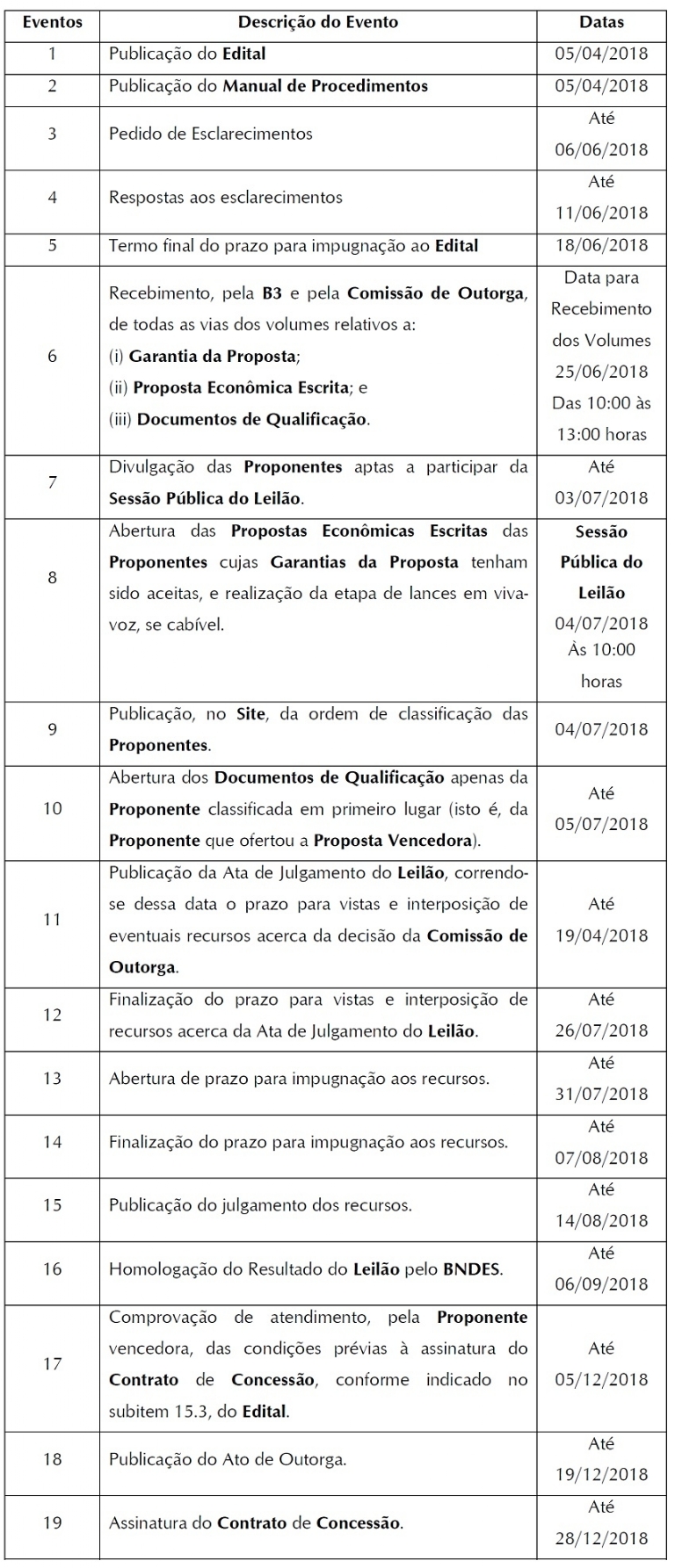

Bidders must present today from 10:00 a.m. to 1:00 p.m., at B3 SA - Brasil Bolsa e Balcão, located in São Paulo (SP), at Rua XV de Novembro, nº 275, Centro, by a representative of the Accredited Brokerage Firms, 3 (three) sealed volumes, in 2 (two) ways each, containing:
i) Volume 1 - Bid Security;
ii) Volume 2 - Written Economic Proposal; and
iii) Volume 3 - Qualification Documents.
The announcement of the tenderers entitled to participate in the Auction Public Session will be held on July 3. The Auction, with the participation of the Proposers who have their Bid Guarantees accepted, represented by Accredited Brokerages, will be held on July 4, 2018, at 10 am, at B3. Then, it will take place the opening of the written economic proposals of the proponents whose guarantees of the proposal have been accepted, and performing the live bids stage, if applicable.
During the course of this year, the process suffered two situations that made the interested companies hesitate.
1) Through the Official Federal Gazette, the Superintendency of Private Insurance (SUSEP), which provides for the capitalization transaction, the modalities, preparation, operation and sale of Capitalization Bonds, published a resolution that allows the operators of this product, can also offer instant awards nationwide without granting to the state. The ruling made the foreign companies concerned very angry.
2) Provisional Measure 841 promulgated by President Michel Temer, which provides for the allocation of proceeds from the collection of lotteries to public security actions, has received 95 amendments from the deputies and senators of the Joint Commission, which must analyze it. Several of them ask to reduce the prizes and funds destined to expenses of costing and maintenance of the operative agent of the new LOTEX. However, according to a clarification issued by the Ministry of Public Security, the government will work to ensure the gross reward and the operator's remuneration, according to the legislation, "in order to ensure the success of this lottery mode, being sure that when the greater the number of bettors, the greater the resources for the Public Security and for the entities of the federation."
The Exclusive Instant Lottery (LOTEX), authorized by Law 13.155, of August 4, 2015, is a lottery mode in which the bettor knows, when he scratches the card, whether he won any prize or not. LOTEX has as its topics: trademarks, emblems, hymns, symbols, shields and similar with regard to the sporting entities of the football modality.
Through the results of studies carried out by the National Development Bank (BNDES), the concession was defined as the form of privatization to be used for this project - a model that presents greater attractiveness to the investor and greater financial return to the government.
Today, in Brazil, there are three types of lottery at the federal level:
a) of draws (Mega-Sena, Lotofácil, Lotomania, Double-Seine, Timemania and Quina);
b) of numbers (Federal Lottery);
c) of sports prognostics (Loteca and Lotogol).
Throughout 2016, the Federal Government raised approximately R$13 billion (US$3.45b) with all these lotteries. In the same period, social transfers totaled just over R$ 6 billion (US$1.58b). Part of the amount collected with federal lotteries is transferred, by legal determination, to social programs of the Federal Government. The funds are earmarked for education (Student Financing Fund for Higher Education), sports (Ministry of Sport, Brazilian Olympic Committee, Brazilian Paralympic Committee and football clubs), culture (National Fund for Culture), security National Penitentiary) and health (National Health Fund).
The LOTEX concession will result in increased competition, modernization and growth of the lottery market in Brazil. Lottery participation in the Brazilian economy today is around 0.21% of GDP. In the world, the lottery market handles about US$ 260 billion a year in business, according to data from the World Lottery Association (WLA). The entity, based in Basel, Switzerland, represents state-owned and private lottery companies in 80 countries.
The amount destined for non-profit purposes, to the benefit of society, totaled US$76 billion in the same period. According to that entity, the sector employs 112 thousand people around the world. The main global product markets are Italy, France, England and some US states, which, even, served as reference for BNDES studies.
The main positive impacts expected from the project are the great potential for collection, the granting of the right to operate LOTEX, the generation of employment and income for the population, and the financing of social causes through onlendings established in the labor legislation creation of this type of lottery.
The studies prepared by the BNDES point to the possibility of a total collection, by the concessionaire, in the order of R$ 6 billion (US$1.58b) already from the fifth year of operation of the service. Of this total, 16.7% will be allocated to social transfers and 2.6% will be related to tax collection.
LOTEX was included in the PPI at the 1st Meeting of the Board, on September 13, 2016, through Resolution No. 8, dated September 14, 2017, which expressed its opinion about the resumption of its privatization process. Subsequently, at the 3rd Meeting of the PPI Council, on August 23, 2017, the concession was approved as an operational modality for the privatization of the lottery.
The bodies involved in the concession process are the Ministry of Finance, the granting authority and responsible for regulating the sector, and the BNDES, responsible for preparing the studies and executing the bidding process for the concession. The concession period was defined by the Ministry of Finance in 15 years and the studies prepared by the BNDES defined a minimum grant value of R$542.1 million (US$143m).
It is possible to point out as factors of attractiveness to potential investors:
a) the 65% payout, which stimulates demand for the product;
b) the legal framework, which guarantees the legal security of the concession;
c) the term of 15 years, which ensures the return of the investments of the private partner;
d) the potential to be explored for the instant lottery service in Brazil.

Source: GMB